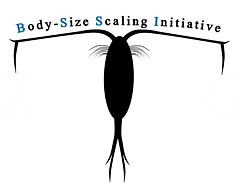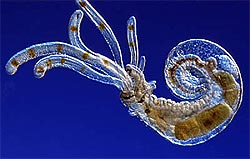Science Club Events - Lent 2014
17 February 2014 - 1pm - Zoology Museum (W129)
Science Club Events - Lent 2014
17 February 2014 - 1pm - Zoology Museum (W129)
Frills and Spills:
The interplay of body size and shape with oxygen in aquatic organisms
Dr. Andrew Hirst
The marine environment, especially the marine pelagic ecosystem, plays a profound role in determining the characteristics of our biosphere and hence is of primary importance to humankind. The zooplankton is one of key groups of organisms in the pelagic environment. However, as our speaker will show, Dr. Andrew Hirst from Queen Mary University London, research on this group of organisms is not only of practical relevance, it offers also exciting opportunities to test fundamental theories in ecology!
Abstract
In this talk we use aquatic organism to test major ecological theories. Firstly, most ectothermic species mature at a smaller size when reared at warmer temperatures. This phenotypic plastic response is termed the Temperature-Size Rule (TSR). The TSR is near universal, yet ultimate causes for it have remained elusive. We test whether oxygen supply is a major driver by looking across environments that differ radically in this respect.
We find that differences between terrestrial, freshwater and marine taxa support the oxygen-hypothesis; maturing at a smaller size as temperature increases is an effective way to balance supply and demand constraints.

In the second part of the talk we test the major theories of metabolic scaling, those based on limits set by the body exchange surfaces, versus those based on internal distribution networks (e.g. the Metabolic Theory of Ecology). Many pelagic invertebrates change shape radically during ontogeny, which allows us to test divergent properties of these theories.
Our results show that shape change closely relates to the intra-specific metabolic scaling in pelagic taxa, and supports the surface-area dependent theory of metabolism.
Recent papers:
Kiørboe T, Hirst AG. (in press) Shifts in mass-scaling of respiration, feeding, and growth rates across life-form transitions in marine pelagic animals. The American Naturalist
Hirst AG, Forster J (2013) When growth models are not universal: evidence from marine invertebrates. Proceedings of the Royal Society B 280: 20131546. http://dx.doi.org/10.1098/rspb.2013.1546
See you at the Zoology Museum - 1pm - everyone is welcome!


No comments:
Post a Comment